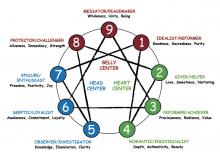These days, if someone asks, “What number are you?” they are likely not asking your age. The Enneagram, a personality typing system based on nine types, has exploded in popularity over the last 20 years. Now Mennonite Central Committee (MCC) Saskatchewan is helping to bring the Enneagram into correctional facilities.
The Enneagram Prison Project (EPP) was launched in the United States in 2009, when EPP’s founder, Susan Olesek, introduced the concepts of the Enneagram and the personal compassion it promoted to a small prison in Texas. The healing fruits of that first experiment were so bountiful that Olesek brought the program back to her home state of California. In 2013, EPP became a national non-profit. Ten years later, the Canadian branch of EPP was founded.
Two women from Saskatchewan, Leanne Schellenberg and Amanda Dodge, have now brought the program into a Saskatchewan correctional facility. (Government rules prevent Canadian Mennonite from naming the institution.) This is the first time the program has run in Canada. Dodge is MCC Saskatchewan’s program director and Schellenberg has done volunteer work in correctional centres for the past four years.
Schellenberg describes the Enneagram as “a personality typing system that helps us understand why we do what we do in a way that leads to wholeness and healing.” While the Enneagram is not Christian per se, she says that, for her personally, “it’s a tool for how to develop an intimate relationship with God.”
For MCC Saskatchewan, partnering with Schellenberg to bring EPP into Saskatchewan correctional centres was an easy choice.
Dodge says: “It fits within the scope of the restorative justice work we’ve been doing for decades, with MCC’s concern for people who harm and are harmed, and to support healing, especially for those who have experienced trauma. For us, it’s about healing and the restoration of relationships.”
When EPP is brought to a correctional facility, two facilitators, called guides, go in and host an eight-module course that involves 24 hours of programming. In Saskatchewan, that looks like doing four days of programming over the course of three weeks. At the end of the first week, participants are invited to write their autobiography in as much or as little detail as they wish. The second week, a sharing circle is held, at which participants read their autobiographies to the group and are encouraged to practise radical compassion for their own stories and the stories of others.
Dodge and Schellenberg say the autobiographical sharing is powerful. Each participant’s biography is shared with an EPP guide from EPP’s Global Guiding Community. The guide writes a compassionate, personal response to the participant. “Having participants read that response is so powerful, just knowing that someone is seeing you, and holding your story compassionately,” says Dodge.
The radical compassion for self and others is at the heart of the program and its transformational power.
“For me, working with EPP’s compassionate curriculum has been a giant journey, to shift my attention to what’s right about me rather than what’s wrong,” says Schellenberg. “This feels both countercultural and counterintuitive. The work that EPP invites participants to enter into is dismantling and relieving, as we asked them to consider what happened to them rather than what’s wrong with them.”
Dodge echoes Schellenberg’s response, saying that the EPP program becomes “an engraved invitation to compassion.”
Schellenberg recounts an example of the effect of this invitation: “At our first program there was a participant who just wanted to sink into the back wall. You know, hair over their face like they didn’t want to exist. When we held our autobiography sharing circle, the participant was already mourning a loss, so we took a moment for their tears. And then this person just began to share about this profound, profound tragedy that had happened to them as a little person, and we made space to hear and hold their story. And in the group there was this beautiful receiving, a mirroring back to them that, ‘It’s not okay what happened to you.’ After that sharing circle, their whole countenance changed. It’s like someone just entered their body. ‘Wow! Here you are!’”
Dodge says about the courage she has witnessed: “One of our participants was a type six on the Enneagram, and generally, that’s the type that struggles the most with anxiety. When it was time for a type exploration interview, most of the sixes in the room were not interested, but this one participant said, ‘I’ll go,’ and they were quite literally shaking in their boots, but they went. Their pain was so close to the surface and raw. I was able to witness just pure courage.”
Currently, Dodge and Schellenberg are the only certified EPP guides in Canada. Schellenberg ran the first course last September. Dodge joined her for another in March, and a third one is planned for June.
The hope is to recruit and train more guides to bring this program to other facilities in other provinces.
Dodge encourages people to consult the EPP Canada website (enneagramprisonproject.ca) or look up its podcast that is on the website. “And please pray for us and our participants,” she says. “We see lots of trauma, which leads to conflict, and now there’s this chance, really, to tell their story, and to do this hard work.”
Schellenberg encourages everyone to apply the principles of the Enneagram and radical compassion to marginalized people in their world. “I’d invite people to do the courageous work of questioning their biases toward those who are incarcerated,” she says. “We’re all fellow humans that suffer. It’s not ‘You’ve done this, and I’ve done this.’ We all have a story. When the truth of our stories shows up in the room, it is beautiful, warm, human; there’s no dividing line. Ideas like unworthy, forgotten, dangerous—that’s not in the room. These are folks who want healing. We don’t change until the pain of staying the same becomes too great.”





Comments
My initial response to this was a bit of resistance to yet another trendy way of doing ministry.
However, I recently read Darrell Heidebrecht's "A Little More Peace in the World," and I'm also rereading Phyllis Tickle's "The Great Emergence: How Christianity is Changing and Why." The good news of Jesus obviously has already encountered a number of changing trends along with endless branding and rebranding of religions, including Christian denominations.
The Bible also makes considerable reference to gifts of the spirit, precisely as the early church was trying to get itself organized in a redemptive way.
I am now thinking that Amanda Dodge and Leanne Schellenberg are using their gifts for a very good and redemptive purpose and increasing the possibility of a little more peace in this world. Amen.
It appears that the Enneagram is replacing the Gospel of Jesus Christ in prison ministry! But what is really needed? Emotional experiences that result from the application of Enneagram principles which temporarily soothe hearts and minds? Or cleansed hearts, lasting forgiveness, and eternal life which result from the sharing of the Gospel of Jesus Christ? These are things that really should be considered.
Add new comment
Canadian Mennonite invites comments and encourages constructive discussion about our content. Actual full names (first and last) are required. Comments are moderated and may be edited. They will not appear online until approved and will be posted during business hours. Some comments may be reproduced in print.